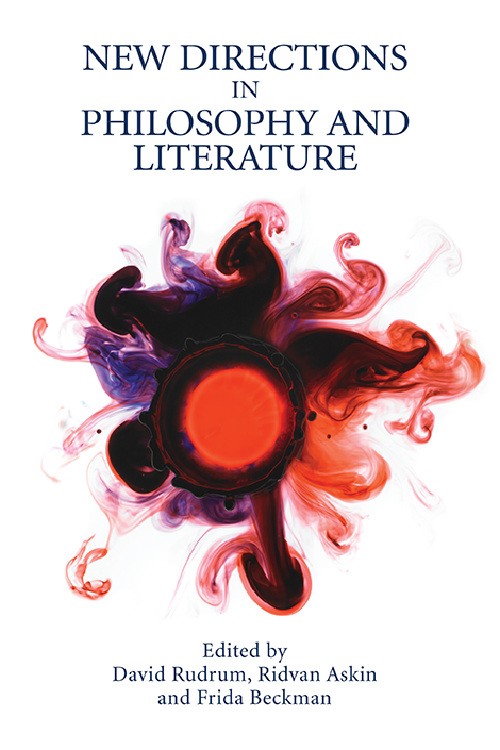Cualquier inquietud sobre el formato de las reseñas, los tiempos, la disponibilidad de títulos, así como la presentación de propuestas debe contactarnos mediante correo a la redacción.
Las reseñas deben tener máximo 10 000 caracteres con espacio, incluyendo título, autor y datos del volumen a reseñar. Los trabajos se entregarán en formato carta (8.5" x 11"), con una tipografía Times New Roman a 12 puntos, con 1,5 espacios de interlineado.
Libros Disponibles para Reseñar
New Directions in Philosophy and Literature
Edited by David Rudrum, Ridvan Askin, Frida Beckman

Abstract:
Maps out how new developments in 21st-century philosophy intersect with the study of literature
- Includes an orientational introduction by Claire Colebrook, one of the world's foremost authorities in the field
- Engages dynamic debates about what it means to be human in face of recent developments in science and technology, the repercussions of anthropogenic climate change, and the overall nature of our contemporary moment
- Draws on new developments in philosophy including speculative realism, object-oriented ontology, the new materialisms, posthumanism, analytic philosophy of language and metaphysics, and ecophilosophy
- Offers close readings of a range of texts from 19th- and 20th-century classics such as Walden, Uncle Tom’s Cabin and Nineteen Eighty-Four to contemporary novels such as A Visit from the Goon Squad, Oryx and Crake and The Stone Gods
This forward-thinking, non-traditional reference work uniquely maps out how new developments in 21st century philosophy are entering into dialogue with the study of literature. Going beyond the familiar methods of analytic philosophy, and with a breadth greater than traditional literary theory, this collection looks at the profound consequences of the interaction between philosophy and literature for questions of ethics, politics, subjectivity, materiality, reality and the nature of the contemporary itself.
PANDEMIC! COVID-19 SHAKES THE WORLD
Slavoj Žižek
Abstract:
As an unprecedented global pandemic sweeps the planet, who better than the supercharged Slovenian philosopher, Slavoj Žižek to uncover its deeper meanings, marvel at its mind-boggling paradoxes, and speculate on the profundity of its consequences, all in a manner that will have you sweating profusely and gasping for breath?
We live in a moment when the greatest act of love is to stay distant from the object of your affection. When governments renowned for ruthless cuts in public spending can suddenly conjure up trillions. When toilet paper becomes a commodity as precious as diamonds. And when, according to Žižek, a new form of communism may be the only way of averting a descent into global barbarism.
Written with his customary brio and love of analogies in popular culture (Quentin Tarantino and H.G. Wells sit next to Hegel and Marx in these pages), Žižek provides a concise and provocative snapshot of the crisis as it widens, engulfing us all.
146 pages • Paperback ISBN 978-1-68219-301-3 • E-book 978-1-68219-246-7
Ciencia, tecnología y sociedad en América Latina. La mirada de las nuevas generaciones

Los estudios sociales en ciencia y tecnología en América Latina cuentan ya con medio siglo de desarrollo en la región. El origen del campo en los años sesenta dotó de características propias que permanecieron, a lo largo de las décadas con diferentes niveles de intensidad, en el marco de nuevos modelos y formas de pensar el desarrollo y de afrontar las condiciones de pobreza y exclusión de nuestras sociedades. Una vez recorrida la etapa de profesionalización del campo –y en diálogo con la dinámica de construcción de estos estudios en los países del norte– se retomaron desde nuevas preguntas y perspectivas aquellas reflexiones iniciadas en los años sesenta, al tiempo que se generaron esfuerzos por construir miradas originales sobre los significados sociales, económicos y políticos de la ciencia y la tecnología. Así se construyeron enfoques y perspectivas analíticas que aprovechan los aportes del campo a nivel internacional y los alimentan con perspectivas regionales. Ciencia, tecnología y sociedad en América Latina está organizado en cinco secciones variadas y heterogéneas, referidas todas ellas a América Latina, en las que se discuten problemas sociales muy diversos. El rico caudal de estas investigaciones sostiene como objetivo común la superación del atraso y de la dependencia de nuestros países, y la búsqueda de estrategias adecuadas en pos de mejorar las condiciones de vida en la región. Con una perspectiva múltiple e interdisciplinar, investigadores jóvenes del continente muestran la riqueza y la relevancia de los estudios actuales en este campo.

